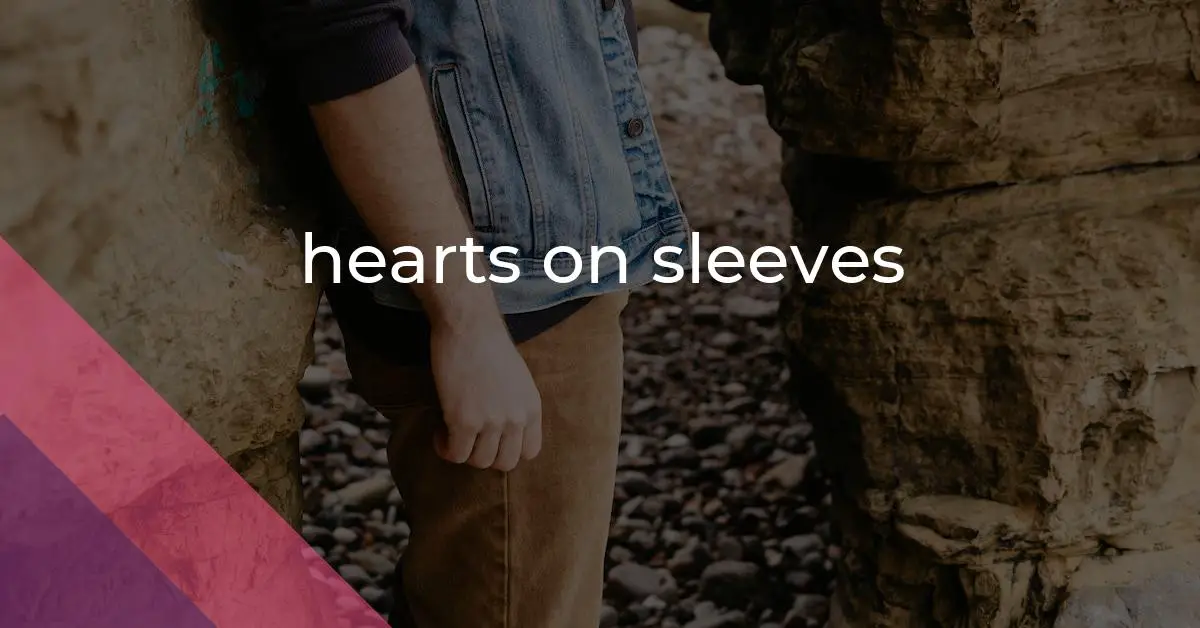hearts on sleeves: Idiom Meaning and Origin
What does ‘hearts on sleeves’ mean?
hearts on sleeves: to openly and easily show one's emotions or feelings; not hiding or containing one's emotions; to be transparent and expressive about one's emotional state.

Idiom Explorer
The idiom "let it all hang out" means to be completely uninhibited or to openly express one's emotions, thoughts, or desires without holding back. It implies being authentic and unrestricted in one's behavior or communication.
The idiom "in plain view" means something that is easily visible or noticeable, without any effort to conceal it.
An idiom used to describe someone who is in an emotional or mental state of extreme agitation, distress, or confusion.
Hearts and flowers refers to a situation or expression of love and romance, often in an idealized or exaggerated way. It can also describe a sentimental or overly romanticized view of a relationship or situation.
The idiom "heart of hearts" refers to one's deepest and truest emotions or beliefs.
The idiom "heart of glass" is used to describe someone who is emotionally fragile or sensitive, often referring to someone who is easily hurt or vulnerable.
The idiom "heart balm" refers to actions or words that are intended to soothe or mend a broken heart or to gain sympathy or affection. It is often used in reference to insincere gestures or false promises made to manipulate someone emotionally.
Deciphering Emotions with "Sleeve Display"
Hearts on sleeves is an idiom with a literal meaning that dates back to medieval times. In the Middle Ages, people believed that emotions, particularly love, came from the heart. It was thought that the heart was the center of a person's feelings and affections. Therefore, wearing one's heart on one's sleeve meant openly expressing or displaying one's emotions.
In the 14th century, the phrase "wear one's heart on one's sleeve" was first recorded in the play "Othello" by William Shakespeare. In Act I, Scene I, Iago says, "For when my outward action doth demonstrate the native act and figure of my heart in compliment extern, 'tis not long after but I will wear my heart upon my sleeve for daws to peck at." Here, Iago is revealing his deceptive nature by pretending to openly express his true feelings, but in reality, he plans to manipulate others for his own gain.
Over time, the idiom evolved to encompass not just love and affection but also other strong emotions such as vulnerability, passion, and sincerity. It came to symbolize a person's willingness to show their true sentiments and be transparent about their emotional state. Someone who wears their heart on their sleeve is often seen as genuine, open, and unguarded.
The idiom gained further popularity in the 19th and 20th centuries, especially in American literature and music. It became a recurring motif in romantic novels and songs, portraying characters who were unashamedly expressive and deeply connected to their emotions. The phrase crossed over into everyday language and is now commonly used in both formal and informal contexts.
Today, "hearts on sleeves" conveys the idea of emotional vulnerability and authenticity. It represents those who are not afraid to let others see their true feelings, even if it means exposing themselves to potential heartache or criticism. It is a reminder that emotional expression is a fundamental part of being human.
hearts and flowers is another idiom related to wearing one's heart on their sleeve. Similar to the broader meaning of "hearts on sleeves," "hearts and flowers" represents a romantic or sentimental expression of love and affection. It conjures images of grand gestures, declarations of love, and showering someone with affectionate attention. The idiom can be used to describe a person who is excessively romantic or prone to dramatic displays of affection.
have a heart is yet another idiom that ties into the concept of wearing one's heart on their sleeve. This phrase is commonly used to urge or appeal to someone's compassion or empathy. It is often said when someone is being cold, unfeeling, or unsympathetic. By saying "have a heart," one is essentially asking the other person to let their emotions guide their actions and to consider the impact of their choices on others.
bare one's soul is a phrase that perfectly encapsulates the essence of wearing one's heart on their sleeve. To bare one's soul is to reveal one's innermost thoughts, desires, and emotions without reservation or pretense. It implies a deep and vulnerable openness, a fearlessness in exposing one's true self to others. Someone who bares their soul is essentially letting others into the depths of their being, allowing for a profound connection and understanding.
heart of hearts is a phrase that speaks to the truest and most intimate part of one's self. It refers to a person's innermost convictions, desires, or truths. It represents the core essence of who they are at their very heart. When someone speaks of their "heart of hearts," they are speaking of their deepest convictions or beliefs, the things that they hold to be the most true and essential to their being.
While the idiom has a well-established meaning, it continues to evolve in response to cultural shifts and individual interpretations. Each person's heart on their sleeve may carry a unique story, revealing layers of personality and experiences. In a world that often values stoicism and guardedness, the idiom serves as a reminder that sometimes it is okay to let our hearts shine through.
Example usage
Examples of how the idiom "hearts on sleeves" can be used in a sentence:
- She is a very emotional person who wears her heart on her sleeve.
- He is not afraid to express his feelings openly and wears his heart on his sleeve.
- Having her heart on her sleeve makes it easy for others to know how she's feeling.
More "Emotions" idioms



